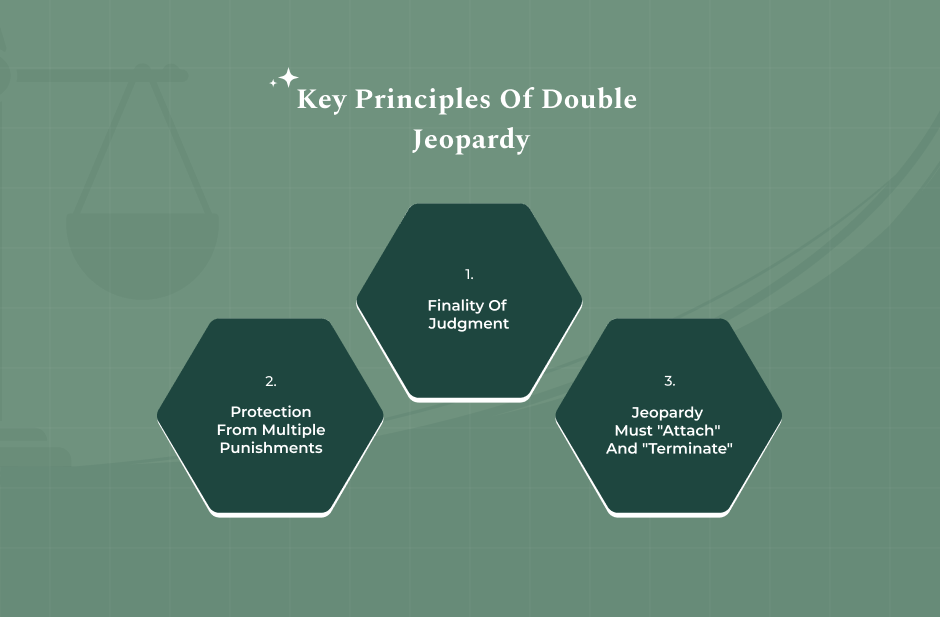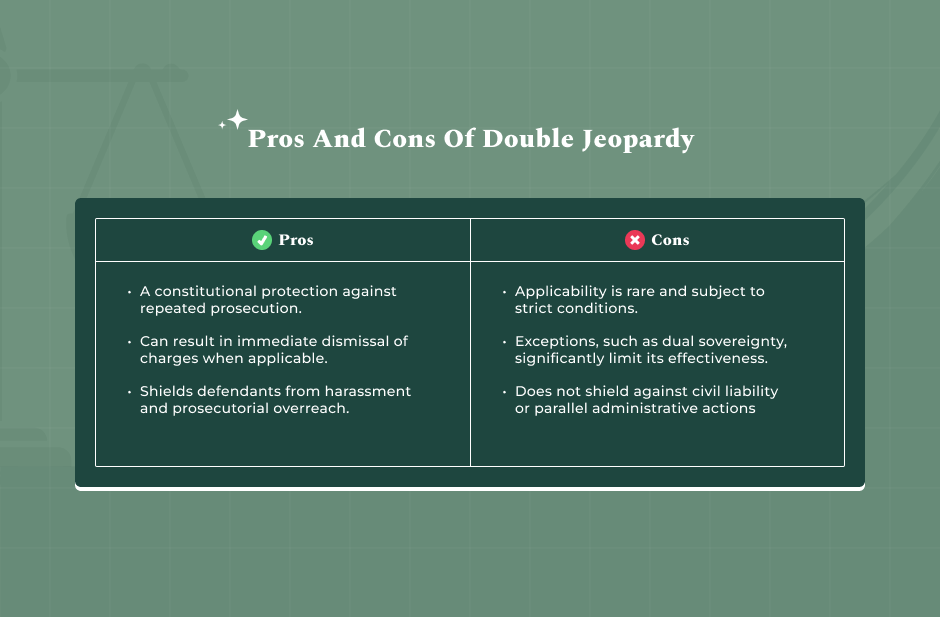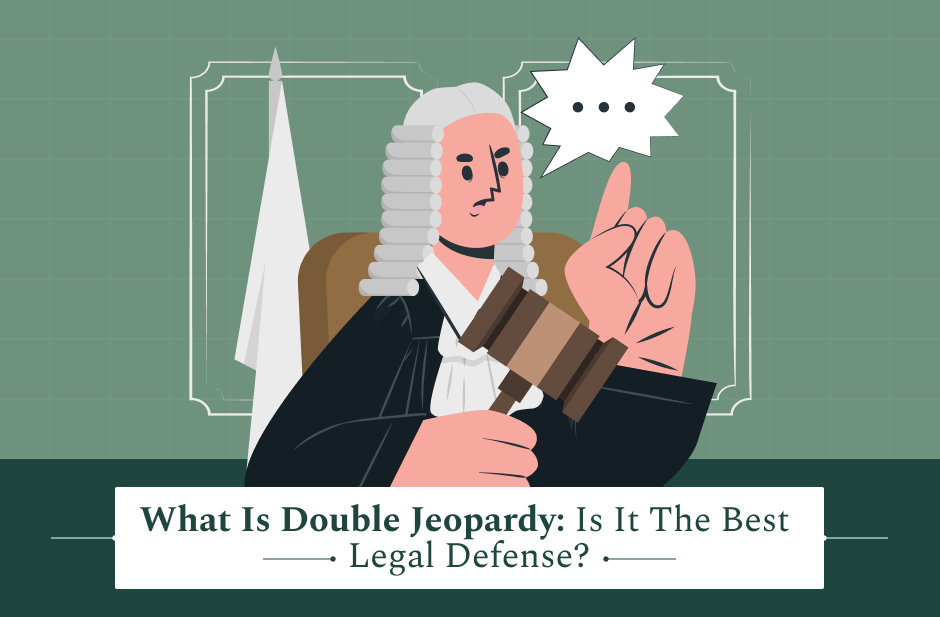On December 15, 1791, the Fifth Amendment to the U.S. Constitution was ratified as part of the Bill of Rights. Among its protections lies a short but powerful phrase:
“…nor shall any person be subject for the same offence to be twice put in jeopardy of life or limb.”
This principle, known as double jeopardy, prevents an individual from being tried twice for the same crime. The rule exists to protect people from harassment, repeated prosecutions, and the heavy burden of reliving criminal trials over and over again.
But is double jeopardy really the best legal defense? Does it apply in every case? And how does it work in practice?
In this article, I will explain:
- What is double jeopardy?
- Its history from Roman law to the U.S. Constitution.
- How and when it applies in criminal cases.
- Exceptions and limitations you should know.
- Whether it truly is the strongest legal defense strategy.
- Global perspectives on the principle.
So if these are questions on your mind, keep reading till the end…
What Is Double Jeopardy?
At its core, double jeopardy is a safeguard against repeated prosecutions. Once a court has issued a final judgment, irrespective of whether it is an acquittal or a conviction, the government cannot prosecute the same individual again for the same offense.
Here are some of the key elements that you need to know:
- It applies only to criminal cases. Civil lawsuits or administrative penalties can still follow.
- It protects against multiple punishments as well as retrials.
Its purpose is:
- Ensuring fairness.
- Preventing government abuse.
- Giving closure to defendants.
To give you a small example, if you are acquitted of burglary, the state cannot put you on trial again for the exact same burglary. However, you may still face a civil lawsuit from the homeowner for damages.
Importance Of Double Jeopardy:
One of the major reasons for the rule against double jeopardy is that the principle gives the following to the legal system:
• Continues the legality of the criminal court processes.
• Sets the boundaries for prosecutors’ powers.
• Gives the financial and emotional protection to the individuals from repeated prosecutions.
The state laws can offer more protection against double prosecutions than the Constitution of the United States, but not less.
What Is The History Behind Double Jeopardy?
Before I explain to you about modern U.S. applications of double jeopardy, here’s a quick look back:
- Roman Law: The Latin principle ne bis in idem (“not twice for the same”) dates back as early as the 6th century A.D. under the Justinian Code.
- English Common Law: By the Middle Ages, English courts recognized pleas of autrefois acquit (already acquitted) and autrefois convict (already convicted).
- United States: With the ratification of the Fifth Amendment in 1791, the doctrine became a constitutional right.
Other countries, such as Canada, India, and the European Union, also recognize similar protections. However, there are different scopes and exceptions.
How Does Double Jeopardy Work?

Now that you are aware of what is double jeopardy, let me tell you how exactly does it works. As you have already understood, Britannica states that “double jeopardy, in law, protection against the use by the state of certain multiple forms of prosecution.”
Here are the key conditions that determine whether this legal protection is applicable to an alleged convict or not:
- Criminal case requirement: The doctrine only applies to criminal prosecutions, not civil or administrative cases.
- Same offense standard: U.S. courts use the Blockburger test, derived from Blockburger v. United States (1932), which evaluates whether each offense requires proof of a fact that the other does not. If they do, separate prosecutions are permitted.
- Attachment and conclusion of jeopardy: Jeopardy “attaches” when a jury is impaneled, a judge begins a bench trial, or a plea is accepted. It ends with a definitive judgment—either acquittal or conviction.
The U.S. Supreme Court reaffirmed the Blockburger standard in United States v. Dixon (1993). It overturned the “same-conduct” rule of Grady v. Corbin (1990) and returned to the established elements-based test.
What Are The Exceptions To The Double Jeopardy Rule?
While it is true that the principle of double jeopardy provides individuals facing convictions with a certain degree of legal protection, there are certain exceptions that still apply to this rule.
Some of the most common exceptions or limitations to this rule are in cases of:
- Mistrials.
- Appeals.
- Dual Sovereignty Doctrine.
For instance, in mistrials, if a trial ends prematurely (e.g., due to a hung jury or procedural error), a retrial is allowed because jeopardy never concluded.
Similarly, convictions overturned due to procedural issues can lead to retrial. However, if the reversal occurred because of insufficient evidence, retrial is barred.
Separate sovereigns, such as state and federal governments, can independently prosecute the same conduct without violating the double jeopardy principle, as was the case in Gamble v. United States (2019).
The Supreme Court upheld this principle in Gamble v. United States (2019), reaffirming that double jeopardy does not protect against successive prosecutions by different sovereigns. The doctrine even applies to tribal and federal prosecutions, as tribes are recognized as separate sovereigns.
Another exception that lies in this case is the “new and compelling evidence” exception. For instance, in jurisdictions like the UK, certain serious crimes (e.g., murder) can justify retrials after acquittal if significant new evidence surfaces.
Double jeopardy, or ne bis in idem as it is frequently defined, is acknowledged at the global level in such instruments as the International Covenant on Civil and Political Rights. However, as a paper in SSRN states, the extent of safeguards against foreign prosecution is completely reliant upon the agreements.
Read Also: Waiver Of Subrogation: Mistakes You Need To Avoid To Stay Safe Legally
Is Double Jeopardy The Best Legal Defense?

Considering the fact that this particular legal principle is often used in the form of a protection, it is only natural that most people ask whether it is really the best legal defense.
However, the shortest answer to this question is no, and I will explain why.
Double jeopardy is a constitutional guarantee. This means the judge has to uphold it in a case if it is valid or applicable. Additionally, if the principle is proven, then it can lead to an outright dismissal of the case.
However, while these are some of the positives of the principle, there are certain weaknesses or drawbacks that one cannot ignore. For instance, while there is scope with this principle, it is rather narrow and faint. This will only apply if all strict conditions are met.
Besides, certain exceptions like dual sovereignty weaken its reach. Additionally, it does not protect against civil lawsuits or professional sanctions.
For instance, in the United States v. Dixon (1993), the Supreme Court clarified that a defendant could still be tried for separate crimes arising from the same act, as long as each crime had unique elements. This shows double jeopardy is not an all-purpose shield.
Practical Insights For Defendants:
• When to raise it: Double jeopardy is a defense to be asserted immediately if prosecutors attempt a retrial for the same crime.
• Get legal counsel: Only a skilled defense attorney can determine whether the prosecution violates this protection.
• Don’t rely on myths: Movies like Double Jeopardy (1999) mislead people into thinking they can commit a second crime without consequence if they were acquitted of the first. That is not how the law works.
Your Legal Guide: The Future Outlook of Double Jeopardy
One of the most powerful protections against criminal law that is still available is double jeopardy. However, its scope is not free from limitations.
By using regulations such as dual sovereignty in America and exceptions for “new evidence” in different countries, courts are striving to maintain a fair balance for defendants while at the same time they are considering society’s interest in justice.
This ancient principle may put up a fight to reform as judicial discussions keep changing and are mostly centered on terrorism, organized crime, and cross-border offenses.
Maybe defendants should consider it first as a significant defense tool and then as a last resort if they fail to convince that they are innocent. Its power is, in the end, a function of the matter, the court, and the specific charges.
















